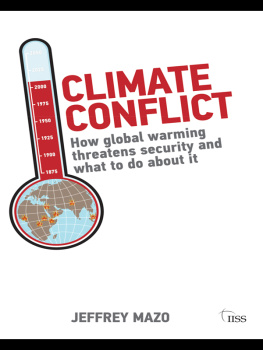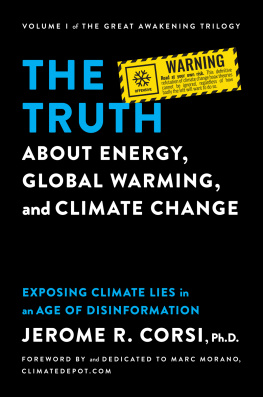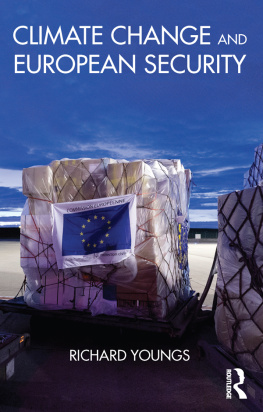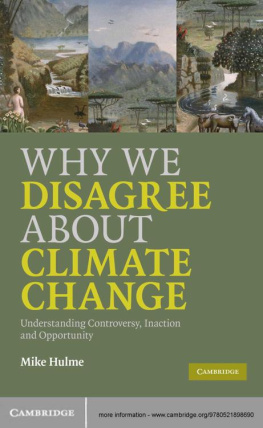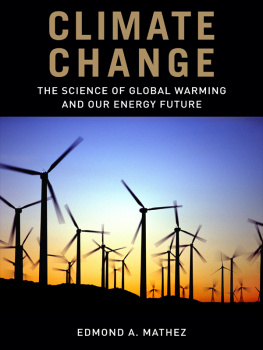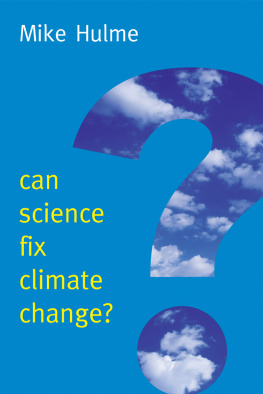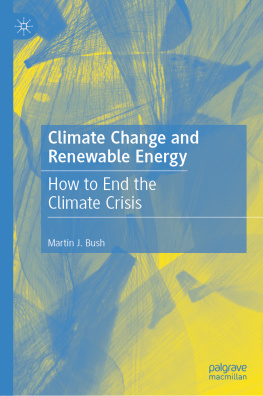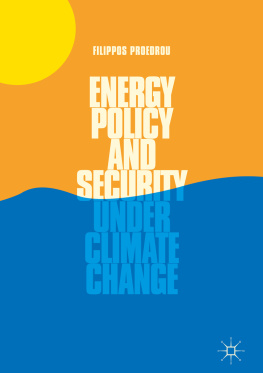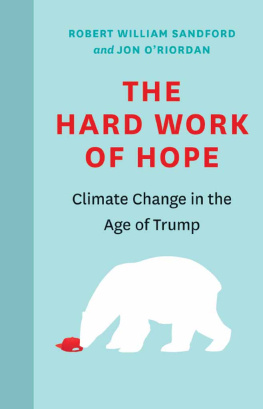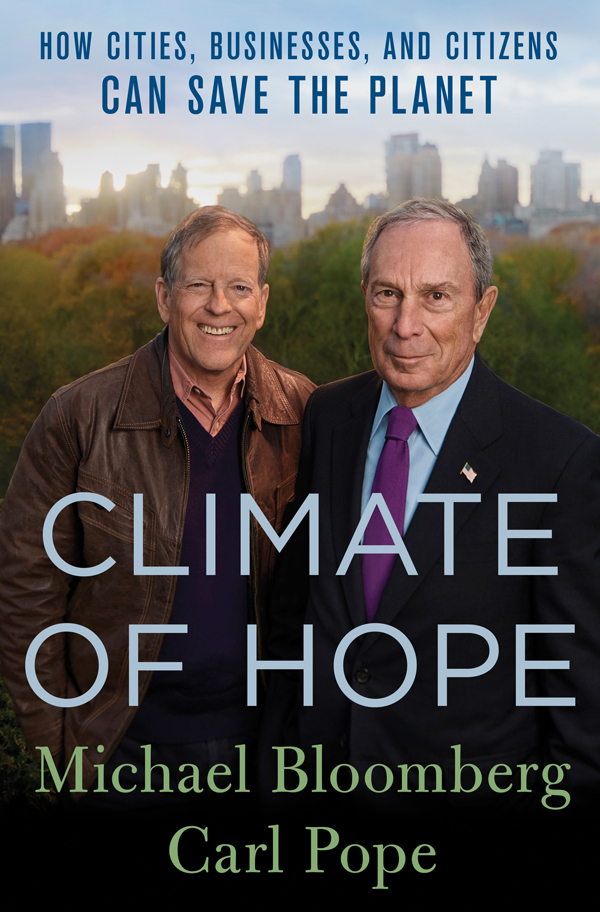Contents
Guide

The author and publisher have provided this e-book to you for your personal use only. You may not make this e-book publicly available in any way. Copyright infringement is against the law. If you believe the copy of this e-book you are reading infringes on the authors copyright, please notify the publisher at: us.macmillanusa.com/piracy.
MICHAEL BLOOMBERG AND CARL POPE
Its easy to be despondent about climate change. The issue received almost no attention during an eighteen-month presidential campaign that tested everyones patience. As a candidate, Donald Trump said he would cancel the 2015 Paris Climate Agreement and roll back many of the Obama administrations efforts to reduce greenhouse gases. His pick to lead the Environmental Protection Agency is known primarily for fighting efforts to tackle climate change. Abroad, Brexit has created questions about Europes ability to unite against this formidable problem. Yes, the Paris Agreement was a major breakthrough in climate diplomacy, but there is nothing enforceable about itno real penalties for countries that dont honor their commitments. On top of all that, the difficulty of preventing the Earths temperature from rising sounds enormous enough to make many people give up and hope for the best.
We see it differently. Through our work with cities, businesses, and communities, we believe that we are now in a better position to stop climate change than ever before. And that in the years ahead, forces outside of Washington can and must deliver new levels of progress.
Lets start with some perspective. It has been more than a decade since a hit film, An Inconvenient Truth , exposed a mass audience to the dangers of climate change and warned of a dark and frightening future. Humanity is sitting on a time bomb, an advertisement for the film read, continuing:
If the vast majority of the worlds scientists are right, we have just ten years to avert a major catastrophe that could send our entire planet into a tailspin of epic destruction involving extreme weather, floods, droughts, epidemics and killer heat waves beyond anything we have ever experienced.
Well, the ten years have come and gone, but the window for action has not closed, and all is not lost. Far from it. In fact, over the past decade we have made critically important progress that allows us to see something that we couldnt in 2006: a realistic path to victory.
The two of us are deeply optimistic about the worlds ability to travel that path, but for reasons that rarely generate much public attention. In the United States, most media coverage of climate change focuses on Washington, where the debate has barely budged over the past twenty years. Democrats are still accusing Republicans and their allies in the fossil fuel industry of ignoring a catastrophe in the making, while Republicans accuse Democrats and their allies in the environmental movement of scaremongering and overstating the science. There is some truth on both sides, but it is obscuring a larger truth: Cities, businesses, and citizens are increasingly taking action on their own, and they have only just begun to fight.
The two of us have no interest in the tired old debate that is still playing out on Capitol Hill. Our interest is not in winning an argument or an election. Its in saving lives, promoting prosperity, and stopping global warming.
We are writing this book because we believe that its time for a new type of conversation about climate change that reverses all the usual ways of looking at the issue. Instead of debating long-term consequences, lets talk about immediate threats. Instead of arguing about making sacrifices, lets talk about how we can make money. Instead of pitting the environment versus the economy, lets consider market principles and economic growth. Instead of focusing on polar bears, lets focus on asthmatic children. And instead of putting all hope in the federal government, lets empower cities, regions, businesses, and citizens to accelerate the progress they are already making on their own.
We believe that by changing the way we think and talk about climate change, we can lower the temperature of the debateand accomplish a whole lot more. Cooler heads can produce a cooler world.
Creating a new type of climate conversation begins with reconsidering the problem itself. Political and environmental leaders both tend to talk about climate change as a single massive problem, and one that only global treaties can solve. But consider this: When scientists set out to rid the planet of disease, they dont attempt to cure every disease at once, and they dont expect a single research team to come up with all the answers. Instead, by working in many different labs all over the world and sharing their discoveries, teams of scientists zero in on a single type of disorder, study its characteristics, research its causes, and experiment with cures. Meanwhile, other teams of scientists tackle other diseases. Its a strategy that has led to countless breakthroughsand its the same approach that we should be taking with climate change.
The changing climate should be seen as a series of discrete, manageable problems that can be attacked from all angles simultaneously. Each problem has a solution. And better still, each solution can make our society healthier and our economy stronger.
Thats worth repeating: Each part of the problem of climate change has a solution that can make our society healthier and stronger. That ideawhich threads through this bookhas been largely missing from the political debate over climate change. In the United States, the debate has too often centered on how likely various doom-and-gloom scenarios are, and when theyll occur. But scaring people doesnt work.
A 2009 study concluded that fear does not, in fact, galvanize people to fight climate change. Although shocking, catastrophic, and large-scale representations of the impacts of climate change may well act as an initial hook for peoples attention and concern, they clearly do not motivate a sense of personal engagement with the issue and indeed may act to trigger barriers to engagement. Other studies have found that using exclusively dire messages about climate change can actually increase skepticism and denial of the problem.
Advocates for climate action also have a tendency to focus on abstract ideas that hold little meaning for most people, such as whether we need to limit eventual warming to 2 degrees Celsius above pre-industrial levels by 2100, or whether the upper limit should be 1.5 degrees. The reality is that the uncertainty involved means we do not know with precision whether we can achieve either of those goals; nor do we know for certain what the consequences will be if we do not. Regardless, most people put little faith in projections that far out, which is understandable. Scientists have been wrong plenty of times before. What people want to know is not exactly what will happen to the Earth eighty years from now but what will happen to their house, their job, and their community this year.
Telling people that they might possibly save the Earth from distant and uncertain harm is not a great way to convince them to support a particular policy. But what happens when you tell people that they can definitely, right now, reduce the number of asthma attacks suffered by children, save their own families and friends from respiratory disease, extend their own life expectancy, cut their own energy bills, make it easier for them to get around town, improve their quality of life, increase the number of jobs in their community, and strengthen our national energy securityall while increasing the long-term stability of the global climate?


